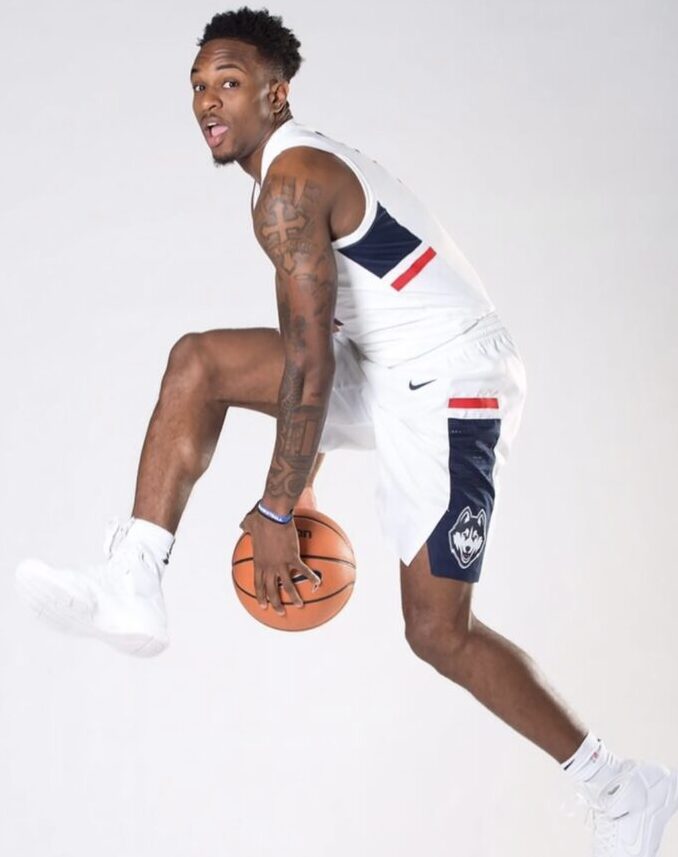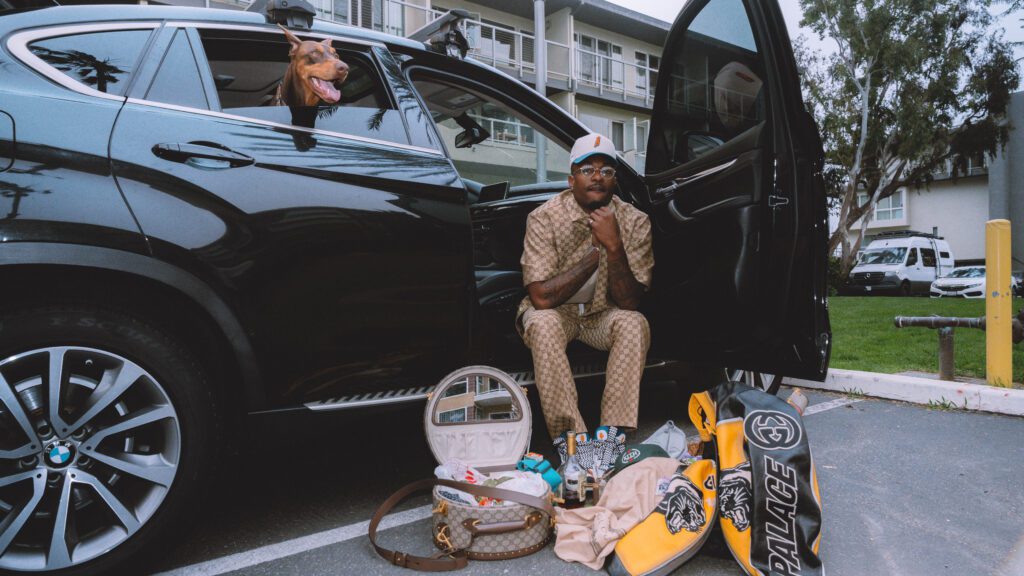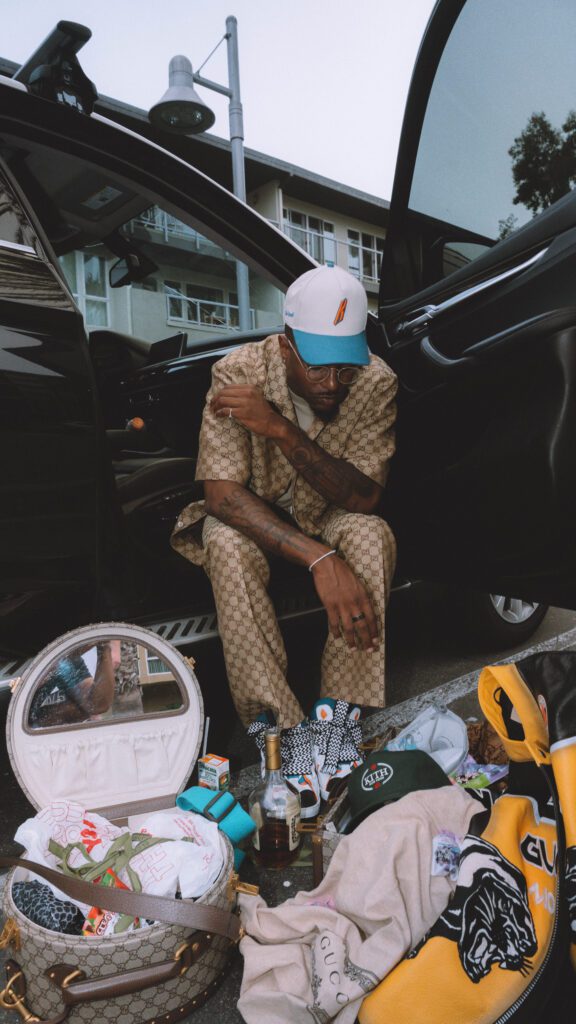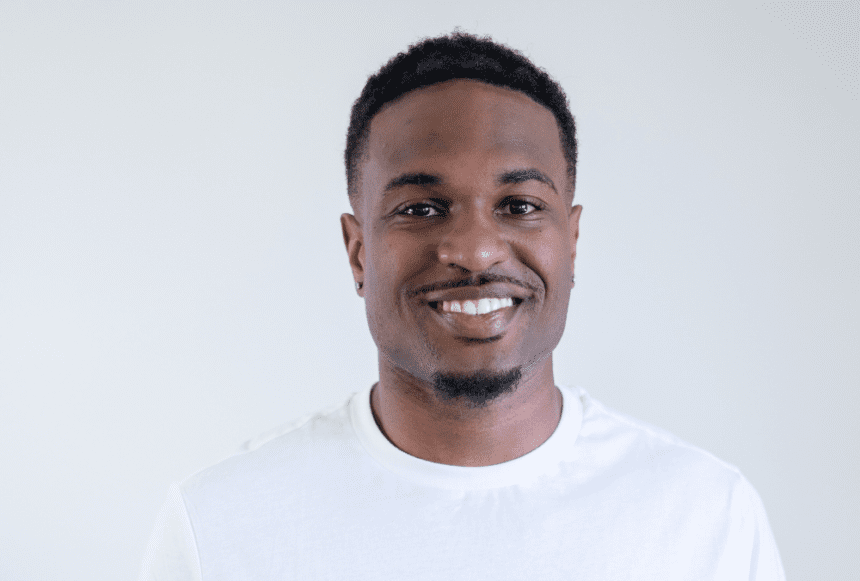ThankYouSmitt is quickly making a name for himself with his unapologetically bold and captivating style, and his new video for “Baretta Everyday Chopper” is the perfect showcase of that swaggering energy. From the very first scene — a fictional newspaper article chronicling his rise — to the gritty visuals that follow, the video from his debut album Call God draws you into his world of confidence, hustle, and raw authenticity. In this interview, we dive deeper into the creative process behind the video, the meaning behind the song, and how ThankYouSmitt balances his East Coast swagger with vulnerability to craft music that resonates on a personal level. Get ready to learn more about the artist’s journey, his vision for the future, and the powerful message that drives him forward.
The “Baretta Everyday Chopper” video features a lot of direct, no-frills shots, which makes the message hit harder. What is your philosophy when it comes to creating visuals for your music?
When creating visuals for my music, I aim to match the vibe and emotion of the song with the visuals paired with it. I often think about big production ideas, but simple, eye-catching videos with great editing can be just as effective. The videographer’s alignment with the creative vision is also crucial since they’re the ones capturing and editing the footage. For “Baretta Everyday Chopper,” my videographer, Swish, and I decided that simple, direct shots would emphasize the song’s message and lyrics while still being visually engaging.
The video opens with a newspaper article about you. Can you talk about the inspiration behind that creative choice?
The newspaper article was entirely my videographer’s creative touch; I can’t deny that. I took the lead on most of the shots in the video, but the article itself was all him. The writing reflects how he views me and his belief in my craft. It’s a reminder that I’m going to keep rising, and there’s nothing anyone can do to stop it. Thank you.
What does that track “Baretta Everyday Chopper” represent for you personally, and how does it tie into the broader themes of your debut album Call God?
Personally, the track represents the progress I’ve made with my music. I think everything came together perfectly—the beat, the lyrics, the vocals, the flow, and the message. At first, it might seem like I’m just talking about carrying a Beretta every day to look cool, but if you listen closely, the last few lines in the second verse say: “Hold on, Smitty Boy got a G.U.N, God, Universe, and Nature; I’m the chosen son. Makes sense I’m the loaded one, I spray blessings, holy ghostin’ ’em.” The Beretta is a metaphor for the blessings, wisdom, and feelings of God in my heart that I hope to share through my music. I want my music to make you “Call God,” and I hope to be the vehicle for His work.
Your academic achievements, including being an Academic All-American, show how disciplined you are. How does that same discipline show up in your approach to music and the creative process?
Ironically, as disciplined as I had to be to achieve success in academics and athletics, I’m the opposite when it comes to my creative process. I go with what feels right at the moment. Sometimes I have a full song written before I even hit the studio, and other times I walk in with just a beat and create or freestyle once I’m in the booth. For example, I wrote half of “Baretta Everyday Chopper” in the car on the way to the studio. I believe creativity flows better when my instincts and feelings take over, rather than sticking to rigid systems or structures about when or how to create.

In Call God, there’s a lot of wordplay and lyrical complexity. How do you approach writing your lyrics? Are you more focused on the flow, the message, or a balance of both?
When writing lyrics, I think it’s important to keep all of those elements in mind. My biggest inspirations in rap are Lil Wayne and J. Cole, which shows how much I value lyricism, flow, storytelling, and the craft as a whole. That being said, the most important trait in lyricism is authenticity. You can be a great technical writer, but if you don’t have that real “drip” that comes from truly living what you’re talking about, it doesn’t hit the same. What makes Call God amazing, in my opinion, is that it’s a concept album. It’s not just a bunch of individual songs thrown together; it’s a collection of tracks that all point toward a similar theme, narrative, and message, while still being strong songs on their own. To me, that’s top-tier creativity and genius (lol)—but for real. Creating a project like this has been at the heart of what I’ve wanted to do since I started making music, and it means a lot to me that I was able to showcase my musical talent while wrapping it into a meaningful message that’s shaped and changed my life.
Having appeared in big productions like Hustle and commercials with Coca-Cola and Hennessy, do you see acting and music as parallel careers, or do you view them as separate creative outlets?
I do view acting and music as parallel careers. I think one can help fuel the other, and vice versa. Music came more naturally to me while acting happened a bit more unexpectedly, but I see both of them supporting and influencing each other. Having my songs synced in commercials or movies is definitely a goal, and creating soundtracks for films or shows would be incredible. Creating visual short films to accompany my projects is also on my bucket list. There are so many possibilities with both.
You’ve worked with big names in music and entertainment. Is there a dream collaboration you’d love to see happen in the near future?
I listen to a wide variety of music, and the range in my playlist often surprises people. I’d be open to collaborating with anyone from any genre, as long as they’re open to getting creative and working together.
What’s the most unexpected lesson you’ve learned so far in your career, whether it’s in music, sports, or entertainment?
I think one of the most unexpected lessons has been my relationship with failure. In school, you’re taught that failure is bad and that it makes you “dumb.” In sports, losing is seen as a failure. So, you grow up thinking failure is the worst thing that can happen—it can even feel crippling at times. But in life, especially on the journey to great success, failure is inevitable. People who quit see failure as a roadblock, while successful people view it as a speed bump. If you learn from your mistakes, analyze them, and grow, you get that much closer to the right answer with every failure you overcome. It’s a testament to the dedication and thick skin you need on the journey to creating yourself and turning your thoughts into reality.
What’s one thing people may not know about you, but you think they should?
One thing people often misjudge about me is how fun my personality actually is. I joke and laugh for most of the day. Whether I’m talking to myself or hanging with friends, I’m always looking for the light in situations and trying to help other people’s light shine too. A lot of people have told me they thought I’d be super serious based on how I look, but the truth is, I’m just a big kid at heart.





